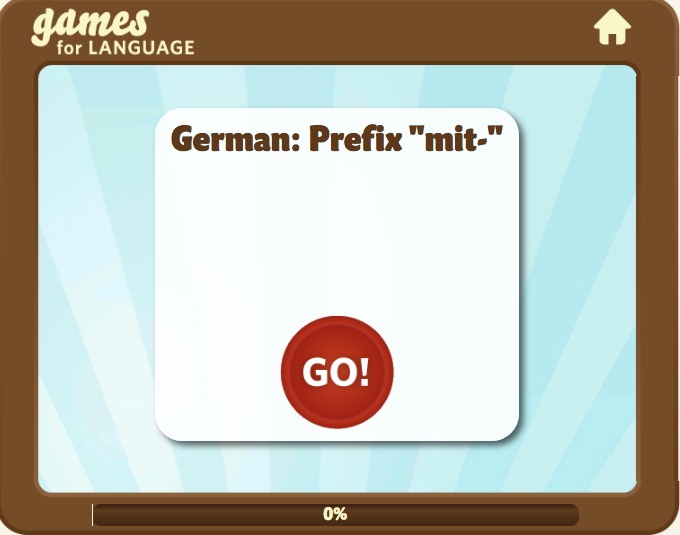The German Separable Prefix “mit-”
 German prefixes are hard for English speakers as they often seem capricious. When used in sentences, they are sometimes attached, and sometimes they're not.
German prefixes are hard for English speakers as they often seem capricious. When used in sentences, they are sometimes attached, and sometimes they're not.
And where to put them if they're not?
Mark Twain, who had a love/hate relationship with the German language, put it this way:
"The Germans have an inhuman way of cutting up their verbs. Now a verb has a hard time enough of it in this world when it's all together. It's downright inhuman to split it up. But that's just what those Germans do. They take part of a verb and put it down here, like a stake, and they take the other part of it and put it away over yonder like another stake, and between these two limits they just shovel in German." (Mark Twain's Speeches, "Disappearance of Literature" in twainquotes.)
Our German Quick Language Game with the separable prefix "mit-" is a popular one. That's not surprising. The separable prefix "mit-" (with, along with) connects to a lot of common verbs, adding the idea of "with [sb]", "along with [sb]", "together with [sb]" etc.
When prefixes in German are added to a verb, they change the verb's meaning, sometimes a lot. But sometimes the new meaning is easy to guess, as in the examples below:
kommen (to come) - mitkommen (to come with, come along).
bringen (to bring) - mitbringen (to bring with, bring along)
nehmen (to take) - mitnehmen (to take with, take along)
What makes German prefixes often tricky is the fact that there are three types of them:
1. Inseparable Prefixes are the easiest ones.
They are never detached from the verb.
Common inseparable prefixes: be-, emp-, ent-, er-, ge-, miss-, ver-, zer-
Examples are:
befreien (to liberate)
empfehlen (to recommend)
entschuldigen (to excuse, apologize)
erkennen (to recognize)
gefallen (to like)
missverstehen (to misunderstand)
versuchen (to try)
zerschneiden (to cut into pieces)
2. Separable Prefixes are the ones that can cause trouble
And there are a lot of them. They detach from the main-clause verb in the present tense and simple past.
Common separable prefixes: ab-, an-, auf-, aus-, bei-, ein-, hin-, her-, mit-, nach-, vor-, zu-, zurück-
abholen (to call for [sb, sth], pick up)
anrufen (to call [sb])
aufmachen (to open)
ausbrechen (to break out, escape)beifügen (to add, enclose)
einladen (to invite)
hingehen (to go there)
herkommen (to come here, approach)
mitkommen (to come with, along)
nachschlagen (to look up [a word])
vorschlagen (to suggest, propose)
zumachen (to shut, close)
zurückgehen (to go back)
3. Prefixes that are Separable or Inseparable
Fortunately there are not that many of them, and we only mention them in case you encounter one of them.
Common examples: durch-, über-, unter-, um-, wider-
The stress on the verb gives you a clue, as in the one example below.
Separable Prefix: umschreiben - to write again, rewrite (literal meaning, "um" is stressed)
Inseparable Prefix: umschreiben - to paraphrase (meaning is not literal, "schreiben" is stressed)
Now, taking our three separable prefix verbs: "mitkommen, mitbringen, mitnehmen", let's look at what happens to "mit-" in the various types of common German sentences.
The Separable Prefix "mit-" in Simple Present-Tense Sentences
In sentences with one subject and one verb, the prefix "mit-" separates from the infinitive and goes the end of a sentence. It is now an independent word.
mitkommen - Kommst du mit? (Are you coming with me/with us?)
mitbringen - Ich bringe ein paar Freunde mit. (I'm bringing a couple of friends with me.)
mitnehmen - Ich nehme es gerne mit. (I'm happy to take it with me.)
The Separable Prefix "mit-" in Simple Past-Tense Sentences
Note: The simple past of verbs is not used a lot in conversational German (except with the verbs "sein" and "haben", and for telling a story or a past event).
You'll see the simple past routinely in books and newspaper stories.It looks like this:
mitkommen - Du kamst mit. (You came with me/us.)
mitbringen - Ich brachte ein paar Freunde mit. (I brought along a couple of friends.)
mitnehmen - Ich nahm es gerne mit. (I was happy to take it with me.)
The Separable Prefix "mit-" as a Past Participle:
Note: The prefix "mit-" attaches to the participle of the stem word, i.e. "gekommen", "gebracht", "genommen".
Here are the same sentences in conversational German.
mitkommen - Du bist mitgekommen. (You came along.)
mitbringen - Ich habe ein paar Freunde mitgebracht. (I brought a couple of friends with me.)
mitnehmen - Ich habe es gern mitgenommen. (I was happy to take it with me.)
The Separable Prefix "mit-" following a Modal Verb:
Not much to worry about here: just use the infinitive.
mitkommen - Du kannst nicht mitkommen. (You can't come along.)
mitbringen - Ich kann ein paar Freunde mitbringen. (I can bring a couple of friends along.)
mitnehmen - Ich kann es gerne mitnehmen. (I can take it with me, no problem.)
Other Verbs with the Prefix “mit-”
The meaning of most of these is easy to guess.
mitreden - to join in or add to a conversation
Da kann ich nicht mitreden. (I can't add anything to this conversation.)
mitgehen - to go with [sb]
Ja, meine Kinder gehen auch mit. (Yes, my children are also going with me.)
mitgehen lassen - to steal, pinch, swipe
Ich glaube, er hat einen Silberlöffel mitgehen lassen. (I think he pinched a silver spoon.)
mitmachen - to join in, take part in [an activity]
Heute hat er beim Spiel nicht mitgemacht. (Today he did not join in the game.)
mitfahren - to ride along [as a passenger]
Kann ich mit dir mitfahren? (Can a get a ride with you?)
mitschreiben - to take notes
Ich mache heute blau. Kannst du für mich mitschreiben? (I'm cutting class today. Can you take notes for me?)
mitspielen - join in the game, be involved
Willst du mitspielen? (Do you want to join in the game?)
mitkriegen - catch, get [what's been said, or done]
Das habe ich nicht mitgekriegt. (I didn't catch that.)
mithalten - to keep up with somebody
Du rennst zu schnell. Da kann ich nicht mithalten. (You're running too fast. I can't keep up.)
The more you engage with a language - by reading, listening, speaking and writing - the more familiar you become with how it works. Prefix verbs are no exception.
Practice with short sentences until you can confidently push those prefixes around. And by the time you are able to "shovel in German" between a prefix and the stem verb, you should feel pretty good about yourself.
